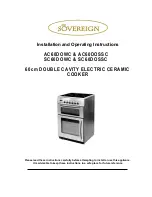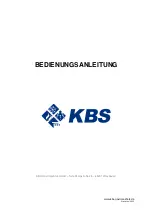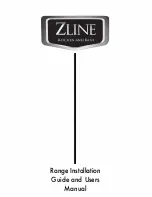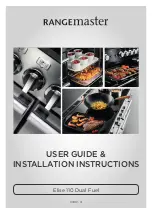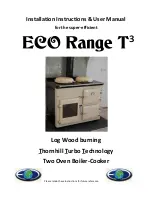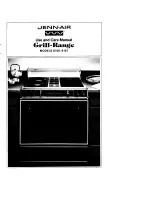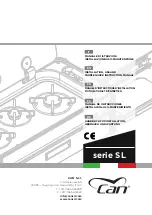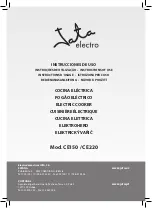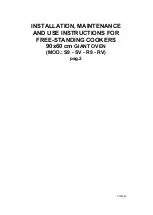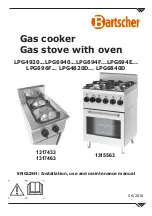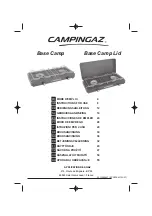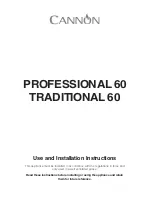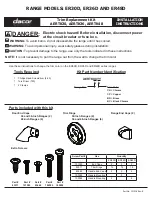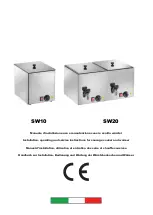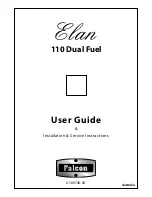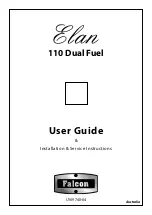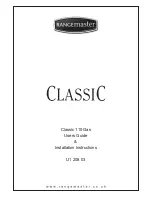
2
Cooking high moisture
content foods can create
a ‘steam burst’ when the
oven door is opened. When
opening the oven stand well
back and allow any steam to
disperse.
ArtNo.324-0001 Steam burst
Always keep combustible materials, e.g. curtains, and
flammable liquids a safe distance away from your cooker.
n
n
DO NOT spray aerosols in the vicinity of the cooker
while it is on.
n
n
Use dry oven gloves when applicable – using damp
gloves might result in steam burns when you touch
a hot surface. Do not use a towel or other bulky cloth
in place of a glove – it might catch fire if brought into
contact with a hot surface.
n
n
NEVER operate the cooker with wet hands.
n
n
DO NOT use aluminium foil to cover shelves, linings
or the oven roof.
n
n
NEVER heat unopened food containers. Pressure
build up may make the containers burst and cause
injury.
n
n
DO NOT use unstable saucepans. Always make sure
that you position the handles away from the edge of
the hotplate.
Never leave the hotplate unattended at high heat settings.
Pans boiling over can cause smoking, and greasy spills may
catch on fire. Use a deep fat thermometer whenever possible
to prevent fat overheating beyond the smoking point.
n
n
WARNING! Unattended cooking on a hob with fat or
oil can be dangerous and may result in fire.
n
n
NEVER leave a chip pan unattended. Always heat fat
slowly, and watch as it heats. Deep fry pans should
be only one third full of fat. Filling the pan too full
of fat can cause spill over when food is added. If you
use a combination of oils or fats in frying, stir them
together before heating, or as the fats melt.
Foods for frying should be as dry as possible. Frost on frozen
foods or moisture on fresh foods can cause hot fat to bubble
up and over the sides of the pan. Carefully watch for spills or
overheating of foods when frying at high or medium high
temperatures. NEVER try to move a pan of hot fat, especially a
deep fat fryer. Wait until the fat is cool.
DO NOT use the top of the flue (the slot along the back of
the cooker) for warming plates, dishes, drying tea towels or
softening butter.
n
n
DO NOT use water on grease fires and never pick
up a flaming pan. Turn off the controls and then
smother a flaming pan on a surface unit by covering
the pan completely with a well-fitting lid or baking
tray. If available, use a multipurpose dry chemical or
foam-type fire extinguisher.
n
n
This appliance is heavy so take care when moving it.
Hob Care
n
n
DO NOT use the hob surface as a cutting board.
DO NOT leave utensils, foodstuffs or combustible items on
the hob when it is not is use (e.g. tea towels, frying pans
containing oil).
n
n
DO NOT place plastic or aluminium foil, or plastic
containers, on the hob.
n
n
DO NOT leave the hob zones switched on unless
being used for cooking.
n
n
NEVER allow anyone to climb or stand on the hob.
DO NOT stand or rest heavy objects on the hob. Although the
ceramic surface is very strong, a sharp blow or sharp falling
object (e.g. a salt cellar) might cause the surface to crack or
break.
n
n
Should a crack appear in the surface, disconnect the
appliance immediately from the supply and arrange
for its repair.
Always LIFT pans off the hob. Sliding pans may cause marks
and scratches. Always turn the control to the OFF position
before removing a pan.
DO NOT
place anything between the base of the pan and the
hob surface (e.g. asbestos mats, aluminium foil, wok stand).
Care should be taken that no water seeps into the appliance.
Only certain types of stainless steel, enamelled steel pans or
cast iron pans with enamelled bases are suitable for induction
hob cooking.
The ceramic surface should be washed after use to prevent it
from becoming scratched or dirty. However, you should clean
the hob with caution as some cleaners can produce noxious
fumes if applied to a hot surface.
n
n
DO NOT use abrasive cleaners/pads, oven aerosols/
pads or stain removers on the surface.
We recommend that you avoid wiping any surface unit areas
until they have cooled and the indicator light has gone off.
Sugar spills are the exception to this (see
‘Cleaning your
Cooker’
). After cleaning, use a dry cloth or paper towel to
remove any cleaning cream residue.
Cooker Care
As steam can condense to water droplets on the cool outer
trim of the oven, it may be necessary during cooking to wipe
away any moisture with a soft cloth. This will also help to
prevent soiling and discolouration of the oven exterior by
cooking vapours.
Summary of Contents for Mercury 1000 Induction
Page 1: ...Mercury 1000 Induction USER GUIDE INSTALLATION INSTRUCTIONS ...
Page 4: ...ii ...
Page 34: ...30 ...
Page 35: ...31 ...






















